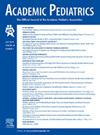Clinician and Care Manager Perspectives on Addressing Chronic School Absenteeism in Primary Care Settings
IF 2.8
3区 医学
Q1 PEDIATRICS
引用次数: 0
Abstract
Objectives
To characterize primary care clinician and care manager perceptions and practice regarding chronic absenteeism.
Methods
In this qualitative study, we developed a semistructured interview guide using the Consolidated Framework for Implementation Research. We conducted Zoom interviews (July to August 2023) with primary care clinicians and care managers affiliated with a child-focused alternative payment model serving Medicaid- and Children’s Health Insurance Program-enrolled children in a 5-county region of central North Carolina. Interviews were recorded, transcribed, and analyzed iteratively using a rapid qualitative analytic approach.
Results
We interviewed 12 participants including 6 clinicians and 6 care managers serving families across urban, rural, academic, and community settings. Key themes included a lack of systematic and universal approaches to discussing school attendance, limited infrastructure for school-health system collaboration resulting in caregiver burden, importance of family engagement, and leveraging unique spheres of influence for multidisciplinary collaboration.
Conclusions
Clinicians and care managers support addressing chronic absenteeism but perceive provider, patient, and system-level barriers to identifying and addressing underlying needs. Perceived facilitators include leveraging strong relationships with families and multidisciplinary collaboration. Health system efforts to operationalize chronic absenteeism as a health metric and to coordinate services across health, education, and social sectors may improve long-term health and academic outcomes.
临床医生和护理经理的观点解决长期缺课在初级保健设置。
背景:入学率是儿童健康和福祉的重要指标。长期缺课(无论出于何种原因缺课至少10%)往往表明健康和社会需求未得到满足。儿科卫生系统在识别和解决慢性缺勤问题方面处于有利地位,但尚未实施相关流程。目的:描述初级保健临床医生和护理经理对慢性缺勤的看法和做法。方法:在这个定性研究中,我们使用实施研究的统一框架开发了一个半结构化的访谈指南。我们对初级保健临床医生和护理经理进行了Zoom访谈(2023年7月至8月),他们隶属于一个以儿童为中心的替代支付模式,为北卡罗来纳州中部五个县地区的医疗补助和儿童健康保险计划注册的儿童提供服务。访谈记录,转录,并使用快速定性分析方法迭代分析。结果:我们采访了12名参与者,包括6名临床医生和6名护理经理,他们在城市、农村、学术和社区环境中为家庭服务。关键主题包括缺乏讨论上学情况的系统和普遍方法,学校卫生系统合作的基础设施有限导致照顾者负担,家庭参与的重要性,以及利用独特的影响范围进行多学科合作。结论:临床医生和护理管理人员支持解决慢性缺勤问题,但认为在识别和解决潜在需求方面存在提供者、患者和系统层面的障碍。可感知的促进因素包括利用与家庭的牢固关系和多学科合作。卫生系统努力将慢性缺勤作为一项健康指标,并协调卫生、教育和社会部门之间的服务,这可能会改善长期的健康和学术成果。
本文章由计算机程序翻译,如有差异,请以英文原文为准。
求助全文
约1分钟内获得全文
求助全文
来源期刊

Academic Pediatrics
PEDIATRICS-
CiteScore
4.60
自引率
12.90%
发文量
300
审稿时长
60 days
期刊介绍:
Academic Pediatrics, the official journal of the Academic Pediatric Association, is a peer-reviewed publication whose purpose is to strengthen the research and educational base of academic general pediatrics. The journal provides leadership in pediatric education, research, patient care and advocacy. Content areas include pediatric education, emergency medicine, injury, abuse, behavioral pediatrics, holistic medicine, child health services and health policy,and the environment. The journal provides an active forum for the presentation of pediatric educational research in diverse settings, involving medical students, residents, fellows, and practicing professionals. The journal also emphasizes important research relating to the quality of child health care, health care policy, and the organization of child health services. It also includes systematic reviews of primary care interventions and important methodologic papers to aid research in child health and education.
 求助内容:
求助内容: 应助结果提醒方式:
应助结果提醒方式:


